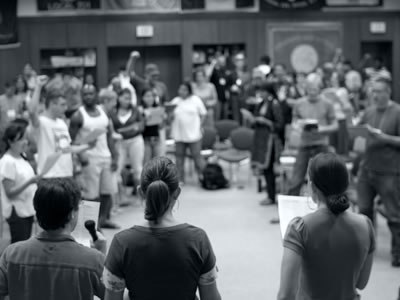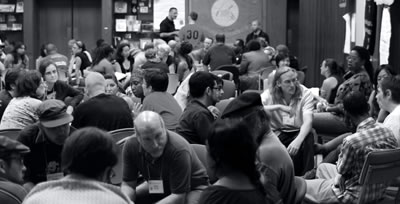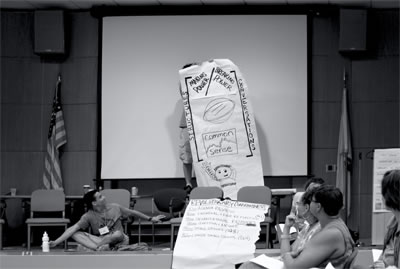Posted November 3, 2008
By Stephanie and Karin
Something took place in New Brunswick, New Jersey this August that you don’t see everyday. A handful of revolutionary organizations came together at a summer school they had jointly planned. They treated each other as comrades, even across organization lines. They emphasized points of unity, instead of points of disagreement. And they decided to continue the process of working together and explore how to expand their relationship after the school was over.

We’re not saying this is the seed of the new upturn that will lead to the great revolutionary movements of the 21st century, let alone the next and final world revolution. Although how can you tell? But it certainly seems to be the sort of thing that’s needed instead of the splintering and stagnation within the left that we’ve been seeing since the late 20th century.
The school was sponsored by five organizations and collectives: Solidarity, Freedom Road Socialist Organization, the League of Revolutionaries for a New America, the New York Study Group, and the LA Crew. These groups had already worked together at the US Social Forum, and wanted to broaden their circle to include social movement activists and representatives from other left organizations who shared common perspectives:.
- Capitalism cannot be reformed; we believe that revolutionary transformation is both necessary and possible.
- Our analysis must incorporate the central importance of race, class and gender.
- An International analysis is both important and necessary.
- Left organizations are necessary, but we need to focus on their relationship with social movements.
- We need to take a non-dogmatic approach to revolutionary theory and practice.
- We need unity on the left.
The school was built primarily around plenary sessions which covered questions such as the history of left movements, the current economic conditions and implications for organizing, theories of revolutionary change, and “who’s in the lead?” of revolutionary movements. Participants could also attend elective sessions on topics such as labor, queer theory, urban struggles, left regroupment/refoundation and Black liberation movements.

Most participants felt the school was a success in bringing together a diverse group of people and creating a feeling of optimism and energy. The majority of participants were women and about half were people of color. A third were queer-identified. Most participants were under age 35 to 40, but the age range was wide, allowing for a cross-generational dialogue.
The weakness of the school was that we were not able to get as deep into political education and discussion as many hoped. We tried to involve many speakers and points of view in long plenary sessions, but that didn’t allow for enough depth. We also learned that there coming from different groups and traditions, we don’t share the same knowledge or terminology or assumptions. It will take time to develop that.
Almost everyone at the school expressed an interest in continuing to find ways to work together. Since the school, the initial five groups have met to evaluate the process and look for new opportunities for joint work. The planning committee has invited more organizations and collectives to participate, and provide representatives to the process.
This fall after the election, we plan to host a series of forums across the country. These will be a place for revolutionaries to come together and figure out areas of common work post-election. We’ll post notices about these forums on this website.
We will also continue to meet across organization to discuss other common work, such as another summer school in 2009, workshops at the 2010 US Social Forum, and perhaps joint study and analysis.

